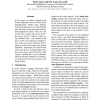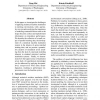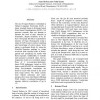281 search results - page 23 / 57 » Similarity-based Word Sense Disambiguation |
126
Voted
TAL
2010
Springer
14 years 10 months ago
2010
Springer
Mihalcea [1] discusses self-training and co-training in the context of word sense disambiguation and shows that parameter optimization on individual words was important to obtain g...
101
click to vote
CICLING
2006
Springer
15 years 4 months ago
2006
Springer
The disambiguation of verbs is usually considered to be more difficult with respect to other part-of-speech categories. This is due both to the high polysemy of verbs compared with...
100
click to vote
COLING
2008
15 years 1 months ago
2008
In this paper we explore robustness and domain adaptation issues for Word Sense Disambiguation (WSD) using Singular Value Decomposition (SVD) and unlabeled data. We focus on the s...
108
Voted
COLING
2010
14 years 7 months ago
2010
In this paper we investigate the challenges of applying statistical machine translation to meeting conversations, with a particular view towards analyzing the importance of modeli...
COLING
2008
15 years 1 months ago
2008
The use of topical features is abundant in Natural Language Processing (NLP), a major example being in dictionary-based Word Sense Disambiguation (WSD). Yet previous research does...



